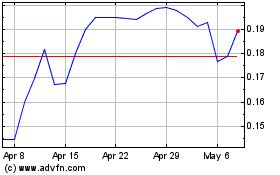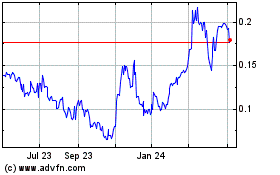PV-10 Immune Mechanism Data to Be Presented at the American Association for Cancer Research Annual Meeting
March 06 2014 - 11:58AM
Business Wire
Moffitt Cancer Center Poster Presentation on
April 6, 2014
Provectus Biopharmaceuticals, Inc.
(OTCQB:PVCT,http://www.pvct.com), a development-stage oncology and
dermatology biopharmaceutical company, announced that data will be
presented by researchers from Moffitt Cancer Center in a poster
presentation at the American Association for Cancer Research Annual
Meeting in San Diego, California.
The poster, based upon abstract #630, entitled "Induction of
anti-melanoma immunity after intralesional ablative therapy,"
authored by Hao Liu, Krithika Kodumudi, Amy Weber, Amod A. Sarnaik
and Shari Pilon-Thomas, will be presented on Sunday, April 6, 2014,
from 1:00 p.m. to 5:00 p.m. in Hall A-E, Poster Section 27.
The abstract reads:
Immunotherapeutic strategies incorporating intralesional (IL)
ablative therapy to elicit a tumor specific immune response are
under investigation as a non-surgical option to induce tumor
regression of cutaneous neoplasms. Rose Bengal (RB) is a
water-soluble xanthene dye that was originally used as an
intravenous liver diagnostic and is in use by ophthalmologists to
stain damaged cells in the eye. In murine models of breast cancer
and melanoma, we have shown that IL injection of PV-10 (10% RB in
saline solution) leads to ablation of injected tumors and
regression of non-injected bystander tumors. In these models,
increased anti-tumor T cell responses were measured, supporting the
induction of systemic anti-tumor immunity after tumor ablation with
PV-10. In our ongoing phase I clinical trial exploring melanoma
regression in patients, IL PV-10 has led to a significant decrease
of melA positive melanoma cells in the biopsies of both
PV10-injected and non-injected lesions. This regression correlated
with increased circulating CD3+T cells (p=0.03) in peripheral blood
mononuclear cells (PBMC). T cells purified from PBMC from a
melanoma patient produced increased IFN-gamma in response to
autologous tumor after treatment with PV-10. Ex vivo models
implemented to investigate this phenomenon indicate that the
cytotoxicity induced by PV-10 is not apoptosis-dependent as
evidenced by Annexin staining of melanoma cells following PV-10
treatment. PV-10 directly induced necrosis of melanoma cells at 50
uM, but was not toxic to healthy fibroblasts at the same dose.
Further preclinical translational testing has shown that treatment
of murine B16 cells with PV-10 leads to release of HMGB1, a soluble
Damage Associated Molecule Pattern (DAMP) that is important for
activation of dendritic cells (DCs). In the murine B16 melanoma
model, there is a significant increase in the number of DCs
infiltrating the tumor-draining lymph nodes after IL injection of
PV-10. These findings suggest that PV-10 treatment leads to the
release of DC activating factors and DC recruitment. Further
studies to determine the role of PV-10 on T cell activation are
ongoing. In sum, these clinical and preclinical results increase
our understanding of the cytotoxic and immunological mechanisms
that may play a role in systemic immunity induced by PV-10 tumor
ablation.
Please see link:
http://www.abstractsonline.com/Plan/ViewAbstract.aspx?mID=3404&sKey=9a90b661-024e-4702-894a-d3f419f9925e&cKey=3ee0b61c-784a-4e56-8ec7-c9b3d868a8b6&mKey=6ffe1446-a164-476a-92e7-c26446874d93
Craig Dees, Ph.D., CEO of Provectus Pharmaceuticals said, "These
data from the translational medicine team at Moffitt represent an
important corroboration of last year’s mouse data in patients with
recurrent locoregionally advanced melanoma. It is virtually
unprecedented for a small molecule ablative agent like PV-10 to
modulate a melanoma patient’s immune response. This healthy tissue
sparing, tumor specific immune response coupled with rapid tumor
burden reduction is a one-two punch against melanoma. Thanks to the
innovative team at Moffitt, we can better explain the consistent
“bystander response” (uninjected tumor regression) observed in our
clinical studies. More data will follow with the poster.”
Provectus’s PV-10, a 10% solution of Rose Bengal, is currently
being examined as a novel cancer therapeutic. It is designed to
selectively target and destroy cancer cells without harming
surrounding healthy tissue, significantly reducing potential for
systemic side effects. In melanoma patients, intralesional (IL)
injection of PV-10 has led to regression of injected lesions as
well as distant metastases (i.e., bystander response).
About the American Association for Cancer Research
The AACR is the oldest and largest scientific organization in
the world focused on every aspect of high-quality, innovative
cancer research. Its reputation for scientific breadth and
excellence attract the premier researchers in the field. The
programs and services of the AACR foster the exchange of knowledge
and new ideas among scientists dedicated to cancer research,
provide training opportunities for the next generation of cancer
researchers, and increase public understanding of cancer.
About Moffitt Cancer Center
Located in Tampa, Moffitt is one of only 41 National Cancer
Institute-designated Comprehensive Cancer Centers, a
distinction that recognizes Moffitt’s excellence in research,
its contributions to clinical trials, prevention and cancer
control. Moffitt is the No. 1 cancer hospital in Florida and has
been listed in U.S. News & World Report as one of “America’s
Best Hospitals” for cancer since 1999. With more than 4,200
employees, Moffitt has an economic impact on the state of nearly $2
billion. For more information, visit MOFFITT.org, and follow the
Moffitt momentum on Facebook, Twitter and YouTube.
About Provectus Biopharmaceuticals, Inc.
Provectus Biopharmaceuticals specializes in developing oncology
and dermatology therapies. Its novel oncology drug PV-10 is
designed to selectively target and destroy cancer cells without
harming surrounding healthy tissue, significantly reducing
potential for systemic side effects. Its oncology focus is on
melanoma, breast cancer and cancers of the liver. The Company has
received orphan drug designations from the FDA for its melanoma and
hepatocellular carcinoma indications. Its dermatological drug PH-10
also targets abnormal or diseased cells, with the current focus on
psoriasis and atopic dermatitis. Provectus has recently completed
Phase 2 trials of PV-10 as a therapy for metastatic melanoma, and
of PH-10 as a topical treatment for atopic dermatitis and
psoriasis. Information about these and the Company's other clinical
trials can be found at the NIH
registry, www.clinicaltrials.gov. For additional information
about Provectus please visit the Company's website
at www.pvct.com or contact Porter, LeVay & Rose, Inc.
FORWARD-LOOKING STATEMENTS: The forward-looking statements
contained herein are subject to certain risks and uncertainties
that could cause actual results to differ materially from those
reflected in the forward-looking statements. Readers are cautioned
not to place undue reliance on these forward-looking statements,
which reflect management's analysis only as of the date hereof. The
company undertakes no obligation to publicly revise these
forward-looking statements to reflect events or circumstances that
arise after the date thereof.
Provectus Biopharmaceuticals, Inc.Peter R. Culpepper,
866-594-5999 #30CFO, COOorPorter, LeVay & Rose, Inc.Marlon
Nurse, DM, SVP, 212-564-4700Investor RelationsorBill Gordon,
212-724-6312Media Relations
Provectus Biopharmaceuti... (QB) (USOTC:PVCT)
Historical Stock Chart
From Mar 2024 to Apr 2024

Provectus Biopharmaceuti... (QB) (USOTC:PVCT)
Historical Stock Chart
From Apr 2023 to Apr 2024
